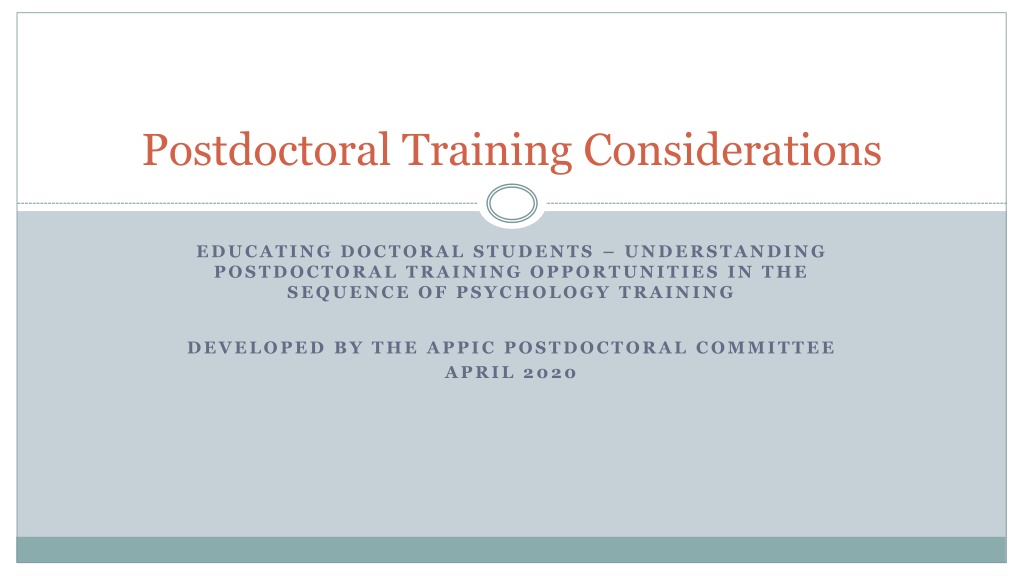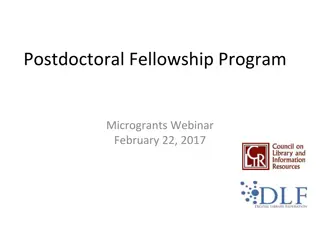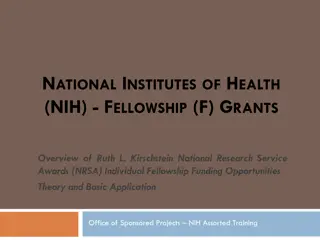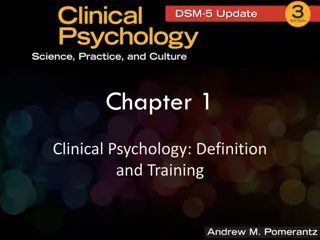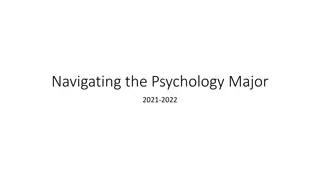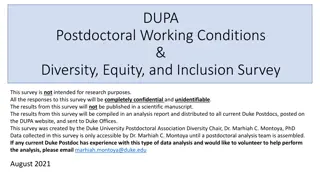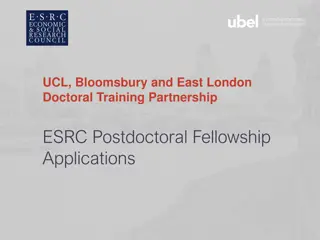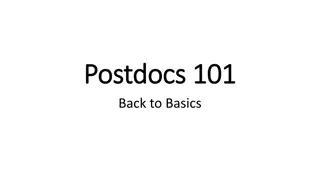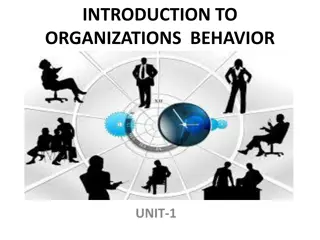Postdoctoral Training in Psychology
Postdoctoral training in psychology plays a crucial role in enhancing career prospects and skills development for graduate students. This training, typically lasting 1-2 years, offers specialized clinical or research training beyond the doctoral degree, increasing marketability and potential for board certification. The presentation discusses the importance of postdoctoral training, factors influencing its relevance, and the educational pipeline within health service psychology. It also provides insights into exploring postdoctoral training options and navigating the application and selection process.
Download Presentation

Please find below an Image/Link to download the presentation.
The content on the website is provided AS IS for your information and personal use only. It may not be sold, licensed, or shared on other websites without obtaining consent from the author.If you encounter any issues during the download, it is possible that the publisher has removed the file from their server.
You are allowed to download the files provided on this website for personal or commercial use, subject to the condition that they are used lawfully. All files are the property of their respective owners.
The content on the website is provided AS IS for your information and personal use only. It may not be sold, licensed, or shared on other websites without obtaining consent from the author.
E N D
Presentation Transcript
Postdoctoral Training Considerations EDUCATING DOCTORAL STUDENTS UNDERSTANDING POSTDOCTORAL TRAINING OPPORTUNITIES IN THE SEQUENCE OF PSYCHOLOGY TRAINING DEVELOPED BY THE APPIC POSTDOCTORAL COMMITTEE APRIL 2020
Goals of Presentation Describe the educational pipeline within health service psychology, including postdoctoral training, given current trends in the field of psychology. Describe factors to consider when exploring postdoctoral training options Provide resources regarding the current application and selection process
Goal One Describe the educational pipeline within health service psychology, including postdoctoral training, given current trends in the field of psychology.
Why is postdoctoral training relevant to a graduate student? Psychology training involves multiple stages, or transitions, within the educational pipeline. Doctoral Internship Training Undergraduate Education Graduate Education Postdoctoral Training Employment Kaslow, N. J., Bengasser, D. A., Grus, C. L., McCutcheon, S. R., & Fowler, G. A. (2018). Facilitating pipeline progress from doctoral degree to first job. American Psychologist, 73, 47-62.
Why is postdoctoral training relevant to a graduate student? Pipeline leakage most often occurs at transition points: securing internship training, postdoctoral training, and employment. Doctoral Internship Training Undergraduate Education Graduate Education Postdoctoral Training Employment Historically, fewer resources devoted to understanding or supporting postdoctoral training Kaslow, N. J., Bengasser, D. A., Grus, C. L., McCutcheon, S. R., & Fowler, G. A. (2018). Facilitating pipeline progress from doctoral degree to first job. American Psychologist, 73, 47-62.
What is Postdoctoral Training (within health service psychology)? Broadly, postdoctoral training is: Training that occurs following completion of the doctoral degree Typically 1 to 2 + years (depending on focus or specialty area) Can be applied (clinical) training or research training, or a combination of both Not required for licensure in all states (but in the majority of states) Additional training that may make one more marketable Additional training that may facilitate board certification
Purpose of Postdoctoral Training Organized sequence of education and training in which there is a commitment to training and/or mentoring the fellow/resident (Belar et al., 1993). Postdoctoral training is designed to develop advanced competency development in either: A recognized specialty area (e.g., Health Psychology, Geropsychology, Neuropsychology, etc.) A focus area within traditional practice areas of Clinical, Counseling, or School Psychology (e.g., PTSD, Addictions).
What is Advanced Competency Development? Demonstration of proficiency in one s focus or specialty area through: Greater independence/autonomy Management of more complex cases Greater depth of knowledge and skill Engagement in range of professional activities within focus/specialty area (e.g., providing supervision, program development/evaluation, program administration)
Postdoctoral Training vs. Postdoctoral Experiences Postdoctoral training may be offered in a formal postdoctoral training program Accredited program APPIC member program Training is primary/emphasized (rather than workload/billable hours or research productivity) Meet guidelines of recognized specialty area, if applicable Postdoctoral opportunities and experiences may be informal Project coordinator Employment May meet long-term professional goals, but generally only with collaborative planning.
Evolving Landscape of Postdoctoral Training Many developments in the field of psychology over the last decade: Emphasis on competency-based education, training, and credentialing (Kaslow, 2004; Kaslow et al., 2004). Qualified entry-level practice following licensure (Model Licensing Act; APA, 2011). Increased specialization and dissemination of taxonomy within specialty training (Rozensky et al., 2015). Changing healthcare system, Affordable Care Act (Rozensky, 2014).
Heterogeneity of Postdoc Programs Unknown universe of programs Number of APPIC member programs - https://membership.appic.org/directory/search Number of UPPD listings - https://www.appic.org/Postdocs/Universal-Psychology- Postdoctoral-Directory-UPPD Update on what is known thus far about the universe of PD programs - https://www.appic.org/Portals/0/2018%20Conference/APPIC%20PD%20Update%20F inal.pdf Varied terminology CoA distinguishes between HSP programs and training in recognized specialties CRSPPP taxonomy https://www.apa.org/ed/graduate/specialize/taxonomy.pdf guidance on labeling depth of experience in recognized specialties Focus areas are experiences that are NOT in recognized specialty areas More unknown what makes a program a program? Are supervised hours for licensure a postdoc program? Focus on training or labor? Quality of supervision
What are Specialties, Emphases, Focus Areas? The role of recognized specialties Specialty Education and Training Guidelines https://www.cospp.org/education-and- training-guidelines-1 What does the specialty require for ABPP or positions? What is the standard? The role of emphasis training Advanced training or specialization In a recognized specialty Indicates depth of specialty taxonomy term The role of focus area training Advanced training In an area other than a recognized specialty
APA Accredited Programs APA s Commission on Accreditation accredits postdoctoral programs in: A major area of training in Health Services Psychology (Clinical, Counseling, School, or other developed practice area) A recognized specialty area
APA Accredited Postdoc Programs -Profession Wide Competencies PWCs different at postdoctoral level than doctoral or internship level PWCs may also differ by program Three levels Level 1: Core, required by all programs Level 2: Determined by the program Level 3: Specific to specialty area of practice, as defined by the Commission on Specialties
APA Accredited Postdoc Programs -Profession Wide Competencies Level 1: Core PWCs required of all programs Integration of science and practice Individual and cultural diversity Ethics and law Level 2: Competencies: Determined by the program, include Level 1, and can include: Research Professional values, attitudes, and behaviors Communication and interpersonal skills Assessment Intervention Supervision Consultation and Interprofessional/Interdisciplinary Skills Level 3: Specific to recognized specialty area of practice and determined by the education and training guidelines for the specialty area as implemented by Council on Specialties (CoS)
Goal Two Describe factors to consider when exploring postdoctoral training options
Important Factors to Consider when Pursuing a Postdoc Formal versus informal Training and marketability Employment versus training Professional identity development Licensure and mobility Research/teaching and practice priorities Personal considerations Duration of training
Reasons to Complete a Postdoc Recent Postdoc Training Summit consensus for advanced or specialized training! Advanced or focused training NOT for remediation of clinical skills To continue or build on research training? How much research? Hours for licensure? Some states require no postdoc hours. Financial considerations Board Certification in recognized specialty McQuaid, E. L., & McCutcheon, S. R. (2018). Postdoctoral training in health service psychology: Introduction to the special section. Training and Education in Professional Psychology, 12(2), 63-65. Silberbogen, A. K., Aosved, A. C., Cross, W. F., Cox, D. R., & Felleman, B. I. (2018). Postdoctoral training in health service psychology: Current perspectives in an evolving profession. Training and Education in Professional Psychology, 12(2), 66-73.
Questions to Assist with Postdoctoral Consideration What are your career aspirations? Prepared for independent practice? Unforeseen consequences? What are your strengths and weaknesses? Professional development? Costs and benefits? Prepared for independent research activities? Prepared for a teaching career? Licensure implications?
What about Regulation and Quality? APPIC/ APA-CPA Accreditation/Other How much regulation is needed? Most PD are not APPIC members or APA/CPA accredited APA/CPA Accreditation may not be as critical as for internship. Not required for certain positions How to ensure a program is of quality Responsibility to trainees and the public How to ensure students are treated fairly How to ensure programs are not subject to unreasonable burden during selection
What is the role of Research? Postdocs were originally geared towards research training Accreditation for clinical programs late 90 s A range of research training in postdocs The Boulder Model seems to have lost importance in recent years APPIC Applicant Surveys range of research interest in applicants Not either/or. Many applicants apply to strong research focused programs and clinical programs offering research training Bodin, D., Schmidt, J. P., Lemle, R. B., Roper, B. L., Goldberg, R. W., Hill, K. R., . . . Siegel, W. (2018). Recruitment and selection in health service psychology postdoctoral training: A review of the history and current issues. Training and Education in Professional Psychology, 12(2), 74-81. Williams, M. E., Sayegh, C. S., & Sherer, S. (2018). Promoting scholarly training in a clinical psychology postdoctoral fellowship. Training and Education in Professional Psychology, 12(2), 90-95.
Where to Learn More Postdoctoral Training Summit https://www.appic.org/Postdocs/Postdoctoral-Training-Summit APPIC Postdoc Webpage https://www.appic.org/Postdocs TEPP Special Section on Postdoctoral Training Postdoctoral Training in Health Service Psychology. (2018). Training and Education in Professional Psychology, 12, 63-124.
Goal Three Provide resources regarding the current application and selection process
The Application and Selection Process Differs Regulation Most are not APA accredited Many are not APPIC members May not be as important for postdocs compared to doctoral and internship programs No overall match or formalized uniform selection process for all PD programs A match does exist for a subset of Neuropsychology Postdocs http://www.appcn.org/matching-program Application cycle Need to start soon after beginning internship Letters from internship supervisors Guidance from internship TD may be variable
How to Learn about Application Process Reach out to multiple sources Good starting points are: Internship Training Director (TD) APPIC https://www.appic.org/Postdocs Listservs Graduate program Director of Clinical Training (DCT) However, knowledge varies Postdoctoral training landscape is constantly changing In part, due to the pool of positions changing each year Be aware, there is a great deal of confusion
How to Learn about Programs APPIC directory is for APPIC member programs only https://membership.appic.org/directory/search Universal Psychology Postdoctoral Directory: https://www.appic.org/Postdocs/Universal- Psychology-Postdoctoral-Directory-UPPD Most programs have used mail groups (VA, APPIC and APA Divisions) Ask supervisors Ask Internship TD Ask faculty from doctoral program APA Monitor Neuropsychology programs APPCN website: listing of Member programs www.appcn.org Society of Clinical Neuropsychology (APA Division 40): comprehensive list of training programs searchable by state and level of training http://training.scn40.org/
APPIC Postdoc Listservs POSTDOC-NETWORK listserv will continue as the forum for programs and applicants to ask questions and generate discussion about postdoctoral training Advertising of postdoctoral programs and psychology jobs is not permitted on POSTDOC-NETWORK Universal Psychology Postdoctoral Directory will serve as the primary source of program marketing. POSTDOC-NEWS which will allow news and information from APPIC about postdoctoral positions including late-breaking news about postdoctoral programs. https://www.appic.org/E-Mail- Lists/Choose-a-news-list/Postdoc-News JOBS-NETWORK which will serve the purpose of announcing psychology jobs or positions that are not part of postdoctoral training programs. https://www.appic.org/E-Mail-Lists/Choose-a-discussion-list/Jobs- Network To sign up for any of the APPIC listservs http://www.appic.org/E-Mail-Lists/Summary-of-APPICs-E-Mail-Lists
References Aosved, A. C. (2016). Tips for trainers: Future directions for postdoctoral training in psychology. APPIC E-Newsletter, 9, 1 3. American Psychological Association. (2015). Standards of accreditation for health service psychology. Washington, DC, US: American Psychological Association. Belar, C. D., Bieliauskas, L. A., Klepac, R. K., Larsen, K. G., Stigall, T. T., & Zimet, T. M. (1993). National conference on postdoctoral training in professional psychology. American Psychologist, 48,1284 1289. http://dx.doi.org/10.1037/0003-066X.48.12.1284 Kaslow, N. J., Bengasser, D. A., Grus, C. L., McCutcheon, S. R., & Fowler, G. A. (2018). Facilitating pipeline progress from doctoral degree to first job. American Psychologist, 73, 47-62. McQuaid, E. L., & McCutcheon, S. R. (2018). Postdoctoral training in health service psychology: Introduction to the special section. Training and Education in Professional Psychology, 12(2), 63-65. Postdoctoral Training in Health Service Psychology. (2018). Training and Education in Professional Psychology, 12, 63-124. Stacy, M., Klee, A., & Jansen, M. (2018). Postdoctoral psychology training in preparation for specialization in serious mental illness. Training and Education in Professional Psychology, 12(2), 96-104. Self, M. M., Wise, E. H., Beauvais, J., & Molinari, V. (2018). Ethics in training and training in ethics: Special considerations for postdoctoral fellowships in health service psychology. Training and Education in Professional Psychology, 12(2), 105-112. Silberbogen, A. K., Aosved, A. C., Cross, W. F., Cox, D. R., & Felleman, B. I. (2018). Postdoctoral training in health service psychology: Current perspectives in an evolving profession. Training and Education in Professional Psychology, 12(2), 66-73.
